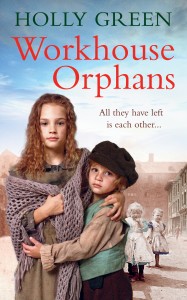WILL THEY EVER ESCAPE THE WORKHOUSE?
Life has always been tough for May and Gus Lavender. Their father went away to sea, never to return, and now their mother has fallen victim to the typhus sweeping through Liverpool. Regarded as orphans by the authorities the siblings are sent to the Brownlow Hill Workhouse.
Like all workhouses Brownlow Hill is the last resort for the poor and the destitute. So May and Gus will have to rely on each other more than ever if they are to survive the hardships to come …
The man led them down a narrow alley and up a flight of steps to a door, on which he knocked.
A gruff voice called, ‘Come in.’
The man opened the door and put hand on May’s shoulder and one on Gus’s to propel them inside. ‘The two new orphans, Governor.’
A man with a bushy beard and side whiskers was sitting behind a desk. ‘Very well. Ask Mrs Court and Mr Taylor to come here.’
The man left and the one he had called ‘governor’ opened a big book and picked up a pen.
‘Name?’
May’s legs were beginning to shake. ‘May Lavender, sir.’
‘Age?’
‘Five and a half, sir. I’ll be six in May.’
‘And the boy?’
‘He’s Gus – Augustus, sir.’
‘Age?’
‘He was three last August.’
The governor peered at her as if he thought she might be telling fibs. ‘You are May, and your birthday is in May. And he is Augustus, and his birthday is in August?’
‘Yes, please sir. It was our father’s idea, I think. That’s what my Mam told me.’
The governor peered at his book and muttered as if he was talking to himself rather then her. ‘Father lost at sea, mother deceased. No other relations.’ There was a knock at the door. ‘Come in.’
Two people entered, a woman in a black dress with a white cap and apron and a man in a grey suit. The governor looked up.
‘Ah, here you are. Two new inmates. May Lavender and her brother Augustus. I’ll leave them in your charge.’
The woman held out her hand. ‘Come along, May. You come with me.’
‘And you come with me, boy,’ the man said.
Gus looked at him and shrank back, grabbing May’s hand.
May said, ‘Please, sir, let him come with me. I always take care of him.’
‘You may have done so,’ the man said. ‘But now he is in my care and he will come with me.’
‘But why can’t we go together,’ May begged. ‘He’s my brother!’
‘That’s as may be. But boys and girls don’t live together here. Gus will sleep in the boys’ dormitory and be taught in the boys’ classes and you will be sleep and be taught with the girls. That is how things are here.’
‘But …’ May began.
‘Enough!’ It was the governor’s voice. ‘You will learn not to argue, or you will regret it. Now, get along with you.’
Gus was still clinging to May’s hand. She bent down to him. ‘You must be a brave boy, Gus. Go along with the gentleman, like he asks.’
‘No! No! I don’t want to,’ he wept, but the man stooped down and picked him up.
‘You will have to learn to do as you are told, boy. Now, shut your noise.’
He headed for the door and as he carried Gus down the stairs May could hear him crying, ‘Let me go, let me go! I want May! May! May!’
The woman grabbed May’s hand. ‘Come along. There’s nothing you can do. He’ll get over it.’
As she was led down the stairs May looked around her through eyes blurred with tears. ‘Please, ma’am, where is this? It’s not a palace, is it?’
‘A palace?’ The woman looked down at her and for a moment it seemed she was going to laugh. ‘Whatever put that idea into you head? Don’t you know what this place is?’
‘No, ma’am. Mrs Johnson said a big house.’
‘And you thought she meant a palace?’ The woman’s voice had softened. ‘You poor mite. This is the workhouse.’

